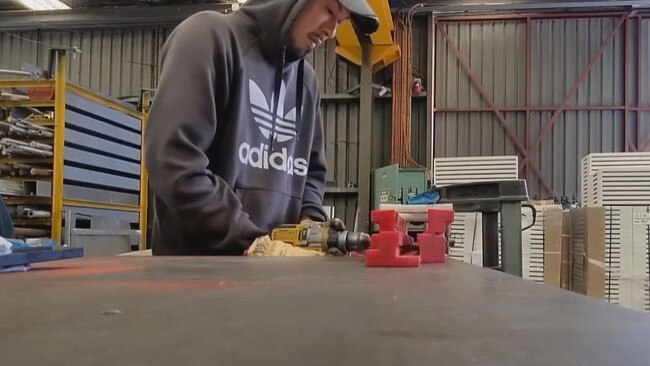Japanese tradie saves $200k after moving to Australia
A tradie has revealed how much more he makes after moving from Japan to work in Australia.

At Work
Don't miss out on the headlines from At Work. Followed categories will be added to My News.
A tradie has revealed he’s managed to save hundreds of thousands of dollars since moving from Japan to Australia on a working holiday.
Shoma Tanak, 33, said his “life has changed” after he left Japan four years ago to work in Sydney, where he’s found a job at a metalworks factory.
Since then, the tradie has managed to buy his father a car and save over $200,000.
It’s a figure he openly shares on social media, where he encourages others to work abroad as Japan grapples with low wages and a cost-of-living crisis.
“It’s been four years and three months since I came to Australia on a working holiday, and I finally saved 20 million yen (about $204,000). The savings I had before going was 1.5 million yen (about $15,000),” he wrote on X this month.
“I was planning to go back (to Japan) in 2020, but before I knew it, I had lived there for four years and was doing the same job as in Japan, and before I knew it, I had saved 20 million yen.”


In a separate post, Mr Tanaka revealed he was earning $3,880,000 yen ($40,000) when he was working in Japan in 2018.
In comparison, he earned more than double – 7,860,000 yen ($80,000) – last year while working in Australia.
2018å¹´ 日本ã§ã®åŽå…¥ã¯388万円
— ã—ょãªã‚‹ (@5h0na1) February 24, 2024
2023å¹´ オーストラリアã§ã®åŽå…¥ã¯786万円
日本ã§åƒã„ã¦ãŸæ™‚より労åƒæ™‚é–“ã‚‚çŸããªã£ã¦ã‚¹ãƒˆãƒ¬ã‚¹ã‚‚ãªã„
åƒã事ã«é–¢ã—ã¦ã‚ªãƒ¼ã‚¹ãƒˆãƒ©ãƒªã‚¢ã¯å‡„ã良ã„環境
è‹¥ãã§æ—¥æœ¬ã®ä»Šã®ç¾çŠ¶ã§ä¸æº€ã‚’æŒã¡ãªãŒã‚‰åƒã„ã¦ã‚‹ãªã‚‰ãƒ¯ãƒ¼ãƒ›ãƒªåˆ¶åº¦ã‚’使ã£ã¦ä¸€åº¦æµ·å¤–ã§åƒã„ã¦ã¿ã‚‹ã®ã‚‚ã„ã„ã¨æ€ã† pic.twitter.com/iZ6DhcESvu
As well as the pay, Mr Tanaka said the working hours are shorter than those of his job in Japan.
“Australia is a very good environment for working,” he wrote on X.
“If you are dissatisfied with your current situation while working, I think it would be a good idea to try working abroad using the working holiday system.”
Mr Tanaka told ABC that while it’s better if those looking for a job in Australia have specialised skills, workers can still have the opportunity to earn good money without.
“Even if Japanese people don’t have skills, the minimum hourly wage is much higher than in Japan, so I think people can make more money than in Japan,” he said.
In Japan, the minimum wage differs between regions.
In Tokyo, where the minimum wage is the highest, workers earn 1,113 yen an hour (less than $12). However, in Okinawa, workers earn the lowest minimum wage of 896 yen (over $9).
In Australia, the national minimum wage is more than double at $23.23 an hour.

Japan’s recession
Japan unexpectedly slipped into a recession earlier this month, falling behind Germany as the world’s fourth-largest economy.
The economy dropped by an annual rate of 0.4 per cent in October to December, according to Cabinet Office data on real GDP.
The number of marriages and babies have also fallen in the country, with younger Japanese reportedly blaming high cost of living and lack of job prospects for their decision to put off marrying and having families.
Births fell for the eighth straight year to a new record low of 758,631, a 5.1 per cent decline in 2022, according to figures released on Tuesday by the Health and Welfare Ministry.
Marriages fell 5.9 per cent to 489,281, falling below half a million for the first time in 90 years, the Associated Press reported.
“People tend to get married and give birth later in life, and in addition to this, the coronavirus may have affected marriages and births,” a health ministry official told The Japan Times.

Chief Cabinet Secretary Yoshimasa Hayashi told reporters on Tuesday that the ongoing declining birthrate was at a “critical state”.
“The period over the next six years or so until the 2030s, when the younger population will start declining rapidly, will be the last chance we may be able to reverse the trend,” he said. “There is no time to waste.”
Prime Minister Fumio Kishida has previously described the declining birthrate as the “biggest crisis Japan faces”, warning last year that the country was “standing on the verge of whether we can continue to function as a society”.
“Focusing attention on policies regarding children and child-rearing is an issue that cannot wait and cannot be postponed,” he said last January.
A package of measures put forward by the Kishida government and adopted earlier this month included more support and subsidies for childbirth, children and their families such as childcare and leave benefits.
The government plans to boost funds for these measures to 3.6 trillion yen (A$36.7 billion) by the 2028 financial year, The Japan Times reported.
But experts have warned the measures may not succeed as they are mainly focused on people who are already married or planning to have children and do not adequately address the growing population of young people reluctant to take the first step, according to the Associated Press.
The National Institute of Population and Social Security Research has projected the population will fall by about 30 per cent by 2070, when four out of every 10 people will be aged 65 or older.
Originally published as Japanese tradie saves $200k after moving to Australia





